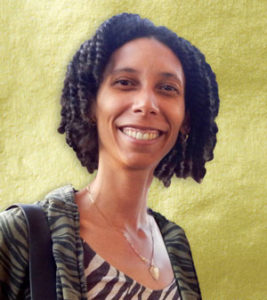 Habiba Alcindor was born Habiba Jabbar in the District of Columbia on May 15th, 1972 to Habiba Raheem and Kareem Abdul-Jabbar. Like her parents, previously known as Janice Brown and Lew Alcindor, Habiba was named by Hamaas Khaalis, the leader of the Hanafi Muslim Community. Like all other children in the insular community, Habiba was home-schooled and practiced Islam, which included dressing in traditional Muslim attire.
Habiba Alcindor was born Habiba Jabbar in the District of Columbia on May 15th, 1972 to Habiba Raheem and Kareem Abdul-Jabbar. Like her parents, previously known as Janice Brown and Lew Alcindor, Habiba was named by Hamaas Khaalis, the leader of the Hanafi Muslim Community. Like all other children in the insular community, Habiba was home-schooled and practiced Islam, which included dressing in traditional Muslim attire.
Habiba’s brother Kareem was born in August of 1976.
In 1977, the “Hanafi Siege” happened, which resulted in the imprisonment of Khaalis and several of Habiba’s friends’ fathers— some of whom remain in prison to this day— and led to the eventual dissolution of the community. In 1978, when her mother was three months pregnant with Habiba’s sister, Sultana, her father announced his wish for a divorce. Upon his insistence, the marriage was dissolved through a religious ceremony. Sultana arrived in April, 1979. In November, 1980, Habiba’s brother Amir was born. Her mother moved back to Los Angeles, her birthplace, and divorced Kareem in civil court. Habiba attended school for the first time in fourth grade. The divorce was finalized in March, 1983.
Habiba always showed an interest in and a talent for writing. She used to concoct film noir style scripts and enlist her brother and sister to play different roles, recording the results on cassette tape.
Habiba’s mother remarried in 1986 and had another son, Habiba’s brother Sean, in 1988.
Habiba graduated high school in 1989, the same year the Lakers missed their chance at a “Three-peat” and her father retired from the sport. The English teachers honored her with a writing award at graduation. She legally changed her last name to Alcindor before attending college at the University of California, Los Angeles, because she considered herself agnostic and wanted a name with a connection to her family history. The National Enquirer interviewed Habiba about her decision and printed a mostly fabricated story about the name change which proved to be a lasting source of bitterness for her father. In September 1991, Habiba’s youngest brother Adam was born. Habiba worked in downtown Los Angeles at her aunt’s criminal defense practice during the O. J. Simpson trial, blocks away from the proceedings.
In 1995, Habiba left Los Angeles permanently to attend Oberlin College, where she graduated with a degree in Creative Writing in 1997. She worked as a waitress, a housekeeper at the Oberlin Inn and a cashier at the newly-opened Feve coffee shop to support herself while there.
After spending two years in Philadelphia, Habiba moved to New York City and worked for Scholastic, Inc., chashama Theater and Cornell Medical College before The Nation hired her as its Communications and Student Outreach Coordinator. She remained at The Nation for nine years, occasionally contributing pieces about people of color, an area that she felt was routinely overlooked by an editorial department that had never included any black, Hispanic or Native American members. She was the only black employee at The Nation from 2009 to 2012, when she left. Her last article covered the People of Color working group of Occupy Wall Street.
When she is not developing and marketing Gold Rush, Habiba works as a media relations specialist for the Federal Emergency Management Agency. She volunteers at Paper Tiger, a radical media collaborative, and is a board member of the Sports Fan Coalition, which lobbies for the rights of players and fans of all sports.

